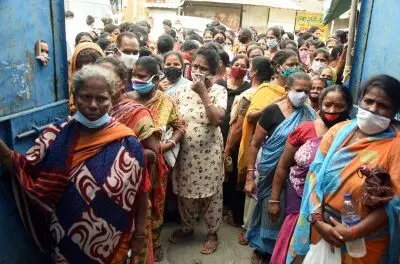
Pandemic Impact: 1 in 10 Indian women ran out of food
text_fieldsNew Delhi: Nearly 3.2 crore women in India, over one in ten women, "limited their food intake or ran out of food" during the Covid-induced lockdown last year, finds a new report, titled 'Impacts of Covid-19 on women in low-income households in India'.
The study conducted by social impact advisory group Dalberg, captures the experiences and perspectives of nearly 15,000 women and 2,300 men across the 10 states of Bihar, Gujarat, Karnataka, Kerala, Madhya Pradesh, Maharashtra, Odisha, Telangana, Uttar Pradesh, and West Bengal from March 24 to May 31, 2020, and the following months from June till October 2020.
The report shows that the pandemic exacerbated women's nutritional challenges, as an additional 3.2 crore reported being worried about food sufficiency in their households.
About 16 per cent of women, who used menstrual pads before the pandemic, had no or limited access to menstrual pads, primarily because they could no longer afford these items.
In addition, more than one in three married women were unable to access contraceptives or 15 per cent of married women could not access contraceptives, primarily due to concerns about accessing a healthcare facility during the pandemic.
While Kerala, Telangana and Uttar Pradesh did well on providing women with both pads and contraceptives, Bihar had the highest proportion of women (49 per cent) with no or low access, the report showed.
Meanwhile, the report also showed that government schemes such as MGNREGA (1.2 crores), Jan Dhan (10 crores), and PDS (18 crores) supported women during the crisis.
About 70 per cent of women in the study depended on PDS for food and nutrition during the crisis than on any other channel.
The lockdown also financially affected women in India, who already constitute a minority in the paid workforce. During April-May, the pandemic resulted in job and income losses for an estimated 4.3 crore women (57 per cent out of the 7.6 crores who were previously employed). One out of four women (6.4 crore women) were yet to meaningfully recover their paid work as of September-October 2020.
An estimated 87 lakh women who were working before the pandemic remained out of work as of October 2020.
Moreover, women experienced a deeper loss and a slower recovery in paid work compared to men -- women made up just 24 per cent of those working before the pandemic and yet, they accounted for 28 per cent of all those who lost jobs, and 43 per cent of those yet to recover their paid work compared to 35 per cent men.





